
The American Civil War was a civil war in the United States from 1861 to 1865, fought between northern states loyal to the Union and southern states that had seceded to form the Confederate States of America. The civil war began primarily as a result of the long-standing controversy over the enslavement of black people. War broke out in April 1861 when secessionist forces attacked Fort Sumter in South Carolina just over a month after Abraham Lincoln had been inaugurated as the President of the United States. The loyalists of the Union in the North, which also included some geographically western and southern states, proclaimed support for the Constitution. They faced secessionists of the Confederate States in the South, who advocated for states' rights to uphold slavery.
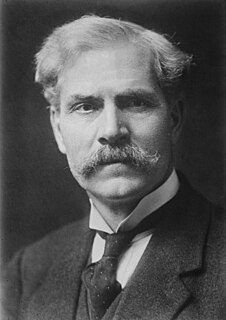
James Ramsay MacDonald was a British politician who was the first Labour Party member to become Prime Minister of the United Kingdom, leading minority Labour governments for nine months in 1924 and then in 1929–31. From 1931 to 1935, he headed a National Government dominated by the Conservative Party and supported by only a few Labour members. MacDonald was expelled from the Labour Party as a result.
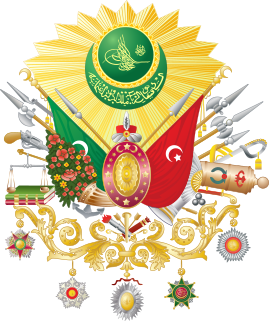
The Ottoman Interregnum, or the Ottoman Civil War, was a civil war in the Ottoman Empire between the sons of Sultan Bayezid I following the defeat of their father at the Battle of Ankara on 20 July 1402. Although Muhammad Çelebi was confirmed as sultan by Timur, his brothers İsa Çelebi, Musa Çelebi, Süleyman Çelebi, and later, Mustafa Çelebi, refused to recognize his authority, each claiming the throne for himself. Civil war was the result. The Interregnum lasted a little under 11 years until the Battle of Çamurlu on 5 July 1413, when Muhammad Çelebi emerged as victor, crowned himself Sultan Mehmed I, and restored the empire.

José Eloy Alfaro Delgado was an Ecuadorian politician who served as the President of Ecuador from 1895 to 1901 and from 1906 to 1911. Alfaro became one of the strongest opponents of pro-Catholic conservative President Gabriel García Moreno (1821–1875) and was known as the Viejo Luchador for playing a central role in the Liberal Revolution of 1895 and having fought conservatism for almost 30 years.

A Scottish clan is a kinship group among the Scottish people. Clans give a sense of shared identity and descent to members, and in modern times have an official structure recognised by the Court of the Lord Lyon, which regulates Scottish heraldry and coats of arms. Most clans have their own tartan patterns, usually dating from the 19th century, which members may incorporate into kilts or other clothing.

Georgism, also called in modern times geoism and known historically as the single tax movement, is an economic ideology holding that while people should own the value they produce themselves, the economic rent derived from land, including from all natural resources and the commons, should belong equally to all members of society. Developed from the writings of American economist and social reformer Henry George, the Georgist paradigm seeks solutions to social and ecological problems, based on principles of land rights and public finance which attempt to integrate economic efficiency with social justice.

Clan MacLeod is a Highland Scottish clan associated with the Isle of Skye. There are two main branches of the clan: the MacLeods of Harris and Dunvegan, whose chief is MacLeod of MacLeod, are known in Gaelic as Sìol Tormoid ; the Clan MacLeod of Lewis and Raasay, whose chief is MacLeod of The Lewes, are known in Gaelic as Sìol Torcaill. Both branches claim descent from Leòd, who lived in the 13th century.

Clan Donald, also known as Clan MacDonald, is a Highland Scottish clan and one of the largest Scottish clans. The Lord Lyon King of Arms, who is the Scottish official with responsibility for regulating heraldry in that country, issuing new grants of coats of arms, and serving as the judge of the Court of the Lord Lyon, recognizes under Scottish law the High Chief of Clan Donald. Historically the chiefs of the Clan Donald held the title of Lord of the Isles until 1493 and two of those chiefs also held the title of Earl of Ross until 1476.
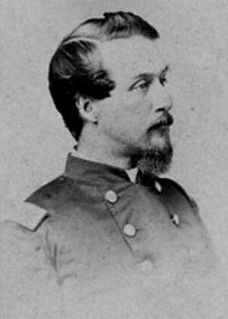
Frank Wheaton was a career military officer in the United States Army during the American Civil War and Indian Wars. He also was military commander over south Texas during the Garza Revolution.
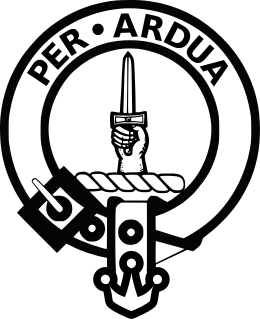
Clan MacIntyre is a Highland Scottish clan. The name MacIntyre, means "son of the carpenter" Although no documented history of the clan exists, it is most commonly said to descend from Maurice Mac Neil a nephew of Somerled, the great 12th century leader of the Scottish Gaels. Through an ingenious strategy, Maurice secured the marriage of Somerled to the daughter of the King of Mann and the Isles, thus greatly increasing Somerled's territories. At an unknown date the clan journeyed from the Hebrides to the Scottish mainland where the chiefs established their home at Glen Noe, in Ardchattan Parish, on the east side of Loch Etive.
Frank Edwards was a teacher and prominent Irish communist.
The War of 1812 bibliography is a selective, annotated bibliography using APA style citations of the many books related to the War of 1812. There are thousands of books and articles written about this topic. Only the most useful are presented.
David Bruce MacDonald is a professor in Political Science at the University of Guelph, Ontario, Canada and is the Research Leadership Chair for the College of Social and Applied Human Sciences. From 2002 to 2008, he worked as a senior lecturer at the Political Studies Department, University of Otago, Dunedin, New Zealand. From 1999-2002 he was Assistant Visiting Professor in the Social Sciences at the ECSP Europe (Paris).
During the War of 1812, Kentucky supplied numerous troops and supplies to the war effort. Because Kentucky did not have to commit manpower to defending fortifications, most Kentucky troops campaigned actively against the enemy. This led to Kentucky seeing more battle casualties than all other states combined.

Alexander W. Terrell was an American judge, planter, Confederate veteran and diplomat. He served as the U. S. minister to Turkey and a Confederate military officer.

Kate Mason Rowland was an American author, historian, genealogist, biographer, editor and historic preservationist. Rowland is best known for her biography of her great-great-granduncle, George Mason, a Founding Father of the United States. Rowland was also a charter member of the United Daughters of the Confederacy. She later went by the name of "Kate Mason."
The question of whether Freemasonry is anticlerical is the subject of debate. The Catholic Church has long been an outspoken critic of Freemasonry, and some scholars have often accused the fraternity of anticlericalism. The Catholic Church forbids its members to join any Masonic society under pain of interdiction. Freemasons usually take a diametrically opposite view, stating that there is nothing in Freemasonry that is in any way contrary to Catholicism or any other religious faith.
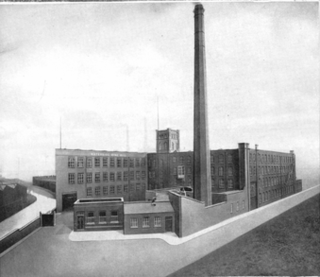
Waterside Mill, Ashton-under-Lyne was a combined cotton spinning weaving mill in Whitelands, Ashton-under-Lyne, Greater Manchester, United Kingdom. It was built as two independent factories. The weaving sheds date from 1857; the four-storey spinning mill dates from 1863. The spinning was taken over by the Lancashire Cotton Corporation in the 1930s. Production finished in the 1950s. Waterside Mill was converted to electricity around 1911.

Angus McDonald was a prominent Scottish American military officer, frontiersman, sheriff and landowner in Virginia.

The Ecuadorian Civil War of 1912–1914 was a civil war fought in Ecuador in the 1910s. It began in 1913, when the Esmeraldas Province rose up against the rule of Leónidas Plaza. Ultimately, the government was able to re-assert control, though much of the province was destroyed in the process.















